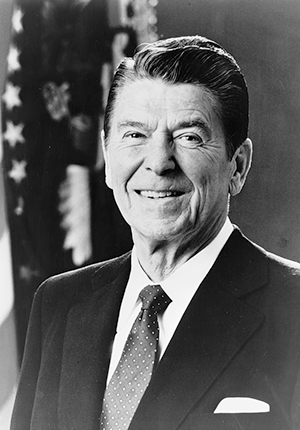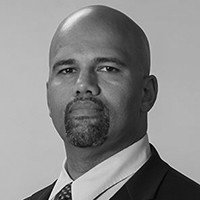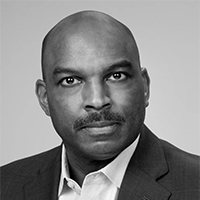Historic Document
Remarks on East-West Relations at the Brandenburg Gate in West Berlin (1987)
Ronald Reagan | 1987

Library of Congress, Prints and Photographs Division
Summary
The Cold War affected virtually all aspects of American life for almost a half century, from 1945-1990. This period was an ideological battle between The West, led by the capitalist United States and NATO, and The East, represented by the communist Soviet Union and the Warsaw Pact, characterized by fears of nuclear war, proxy wars (i.e. Vietnam), “Duck and Cover” drills, and other institutional and public reactions. The watershed moment marking the end of the Cold War came in 1987, when President Ronald Reagan delivered a speech calling on General Secretary of the Communist Party of the Soviet Union Mikhail Gorbachev to tear down the Berlin Wall, a physical barrier erected in 1961 between Eastern and Western sectors of Berlin.
Selected by

Christopher Brooks
Professor of History, East Stroudsburg University

Kenneth Mack
Lawrence D. Biele Professor of Law, Harvard Law School
Document Excerpt
Behind me stands a wall that encircles the free sectors of this city, part of a vast system of barriers that divides the entire continent of Europe. From the Baltic, south, those barriers cut across Germany in a gash of barbed wire, concrete, dog runs, and guard towers. Farther south, there may be no visible, no obvious wall. But there remain armed guards and checkpoints all the same—still a restriction on the right to travel, still an instrument to impose upon ordinary men and women the will of a totalitarian state. . . . Standing before the Brandenburg Gate, every man is a German, separated from his fellow men. Every man is a Berliner, forced to look upon a scar.
. . .
. . . We hear much from Moscow about a new policy of reform and openness. Some political prisoners have been released. Certain foreign news broadcasts are no longer being jammed. Some economic enterprises have been permitted to operate with greater freedom from state control. Are these the beginnings of profound changes in the Soviet state? Or are they token gestures, intended to raise false hopes in the West, or to strengthen the Soviet system without changing it? We welcome change and openness; for we believe that freedom and security go together, that the advance of human liberty can only strengthen the cause of world peace.
There is one sign the Soviets can make that would be unmistakable, that would advance dramatically the cause of freedom and peace. General Secretary Gorbachev, if you seek peace, if you seek prosperity for the Soviet Union and Eastern Europe, if you seek liberalization: Come here to this gate! Mr. Gorbachev, open this gate! Mr. Gorbachev, tear down this wall!
. . .
As I looked out a moment ago from the Reichstag, that embodiment of German unity, I noticed words crudely spray-painted upon the wall, perhaps by a young Berliner, “This wall will fall. Beliefs become reality.” Yes, across Europe, this wall will fall. For it cannot withstand faith; it cannot withstand truth. The wall cannot withstand freedom. And I would like, before I close, to say one word. I have read, and I have been questioned since I’ve been here about certain demonstrations against my coming. And I would like to say just one thing, and to those who demonstrate so. I wonder if they have ever asked themselves that if they should have the kind of government they apparently seek, no one would ever be able to do what they’re doing again. Thank you and God bless you all.




